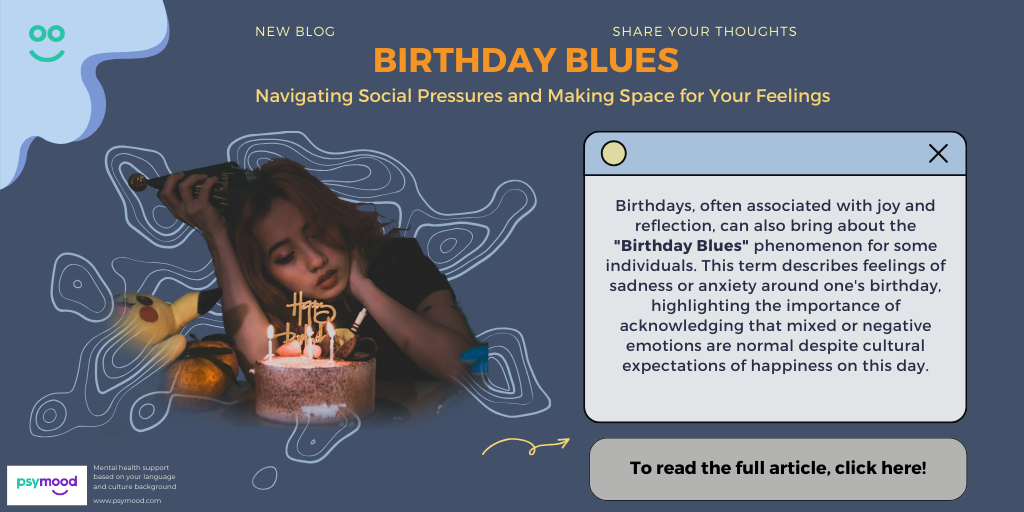Birthday Blues: Navigating Social Pressures and Making Space for Your Feelings
Birthdays are traditionally a time of joy, celebration, and reflection. However, for some individuals, the festivities can bring about a phenomenon known as “Birthday Blues.” This experience encompasses a range of negative emotions that may arise in the midst of what should be a joyous occasion. Birthday Blues is a term used to describe the feelings of sadness, anxiety, or general unease that some individuals may experience on or around their birthdays. Despite the cultural expectation of happiness on this day, it’s crucial to recognize that experiencing mixed or negative emotions is entirely normal.
The pressure to be happy on one’s birthday is a common societal expectation that can contribute to stress and emotional discomfort for many individuals. While birthdays are traditionally associated with joy, celebration, and positive emotions, the pressure to maintain a constant state of happiness on this particular day can create a burden for some. Several factors contribute to this pressure:
- Cultural Expectations: In many cultures, birthdays are viewed as a time of celebration, often accompanied by parties, gifts, and well-wishing. The cultural narrative emphasizes happiness as the primary emotion associated with birthdays, setting an expectation for individuals to be cheerful and excited.
- Social Media Influence: The rise of social media has amplified the pressure to showcase a picture-perfect life, including birthday celebrations. Seeing elaborate and seemingly perfect birthday posts on platforms like Instagram and Facebook can create a sense of comparison, where individuals feel the need to meet or exceed the standards set by others.
- Family and Friends Expectations: Family and friends may have their own expectations about how a birthday should be celebrated, adding an additional layer of pressure. The desire to meet the expectations of loved ones can contribute to a sense of obligation to be visibly happy, even if one is not feeling that way internally.
- Fear of Disappointing Others: Individuals may fear disappointing those around them, especially if others have gone out of their way to plan surprises or celebrations. This fear of letting others down can lead to the suppression of true emotions, as individuals may prioritize maintaining a facade of happiness.
- Personal Reflection and Assessment: Birthdays often prompt individuals to reflect on their lives, accomplishments, and future goals. The pressure to feel happy on one’s birthday can intensify feelings of inadequacy or self-doubt if the individual believes their life does not align with societal or personal expectations.
- Avoidance of Pity or Concern: Some individuals may fear that expressing anything other than happiness on their birthday may lead to pity or concern from others. This concern about how others perceive them can contribute to the pressure to present a happy exterior.
Experiencing emotions other than joy on your birthday is very normal. At the end of the day, you’re welcome to choose how you’d like to spend your day. However, it may be difficult to navigate the pressures of birthdays which can paint your birthday in a negative light. Here are some ways to bring yourself comfort:
- Normalize a Range of Emotions: Understand that it’s normal to experience a range of emotions, including happiness, on your birthday. Embracing the full spectrum of emotions can help alleviate the pressure to conform to a specific mood.
- Communicate Your Feelings: If you’re feeling pressured to be happy, communicate your emotions to those close to you. Sharing your feelings can foster understanding and support, creating a more authentic and meaningful celebration.
- Set Realistic Expectations: Manage your own expectations and recognize that birthdays don’t have to be perfect. Setting realistic expectations can reduce the pressure to conform to an idealized version of a celebration.
- Focus on Personal Well-Being: Prioritize your own well-being on your birthday. Engage in activities that genuinely bring you joy and fulfillment, rather than succumbing to external expectations.
- Practice Self-Compassion: Be kind to yourself. Understand that it’s normal to experience a range of emotions on your birthday and that self-compassion is a crucial component of emotional well-being.
- Connect with Loved Ones: If possible, surround yourself with friends or family who understand and support you. Social connections can provide comfort and alleviate feelings of loneliness.
- Engage in Meaningful Activities: Plan activities that bring you joy and fulfillment, whether it’s a hobby, a quiet moment of reflection, or spending time in nature. Focus on activities that align with your interests and values.
- Digital Detox: Consider taking a break from social media to reduce the pressure of comparison. Disconnecting from virtual platforms can help you stay present and appreciate the genuine moments of your celebration.
- Seek Professional Support: If the Birthday Blues persist or become overwhelming, don’t hesitate to reach out to a mental health professional. Therapy can provide valuable insights and coping strategies tailored to your individual needs.
Final Thoughts
Navigating Birthday Blues involves understanding that these feelings are a common part of the human experience. By acknowledging the potential causes and implementing self-care strategies, individuals can transform their birthdays into opportunities for personal growth, self-reflection, and genuine celebration. Remember, the most important aspect of any birthday is recognizing and honouring your own well-being.
For More Interesting Posts
More resources: Embracing Holistic Wellness: A Path to Mental Health, Cultivating Mental Clarity: Meditation Techniques for Improved Focus and Memory at Work, Balanced Living: Measuring All Aspects of Health


.png)
.png)
.png)
Recent Comments